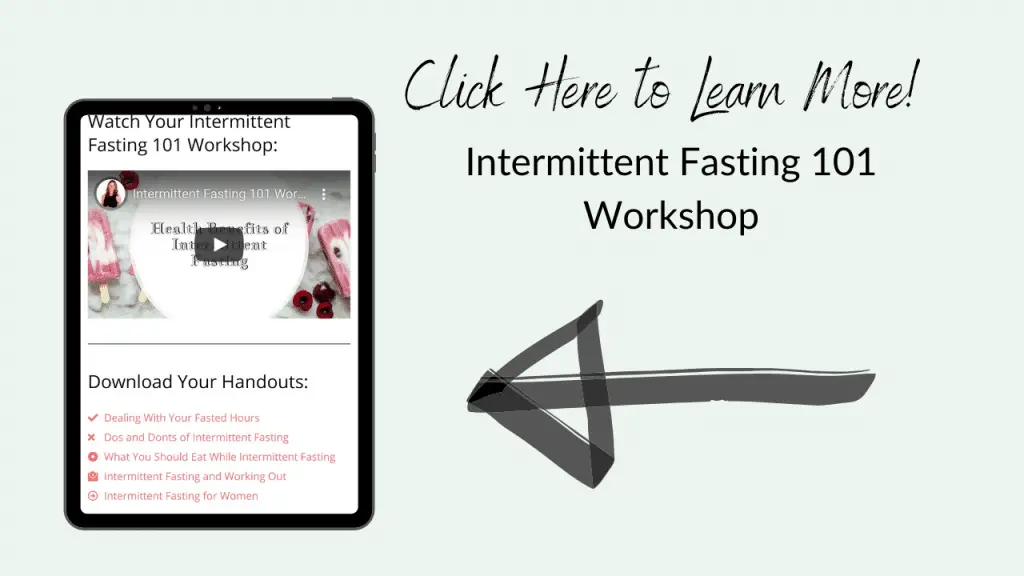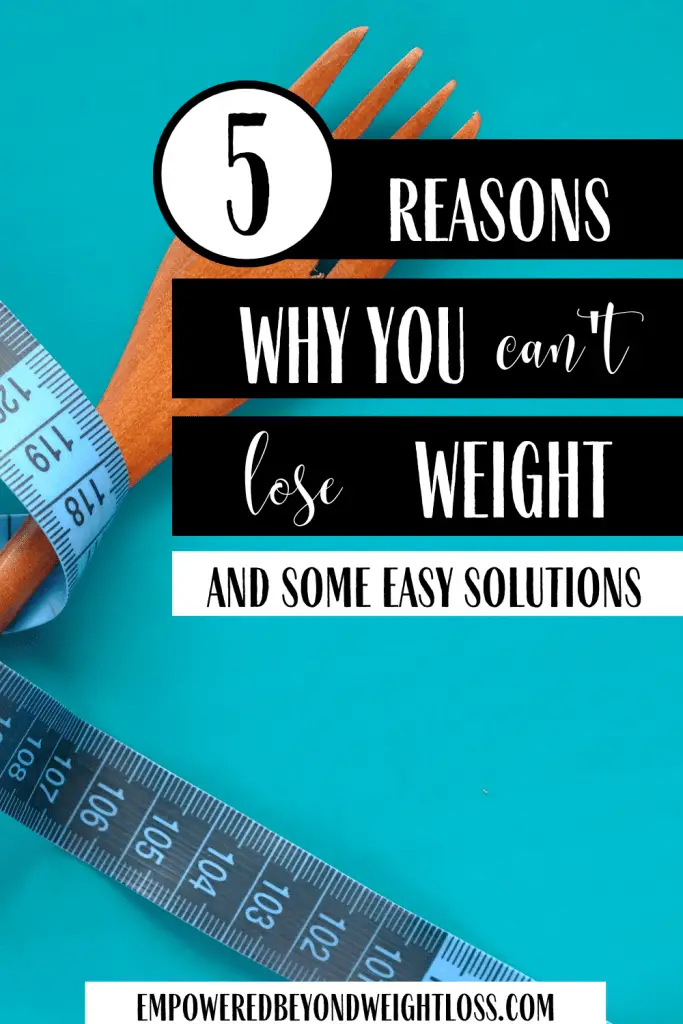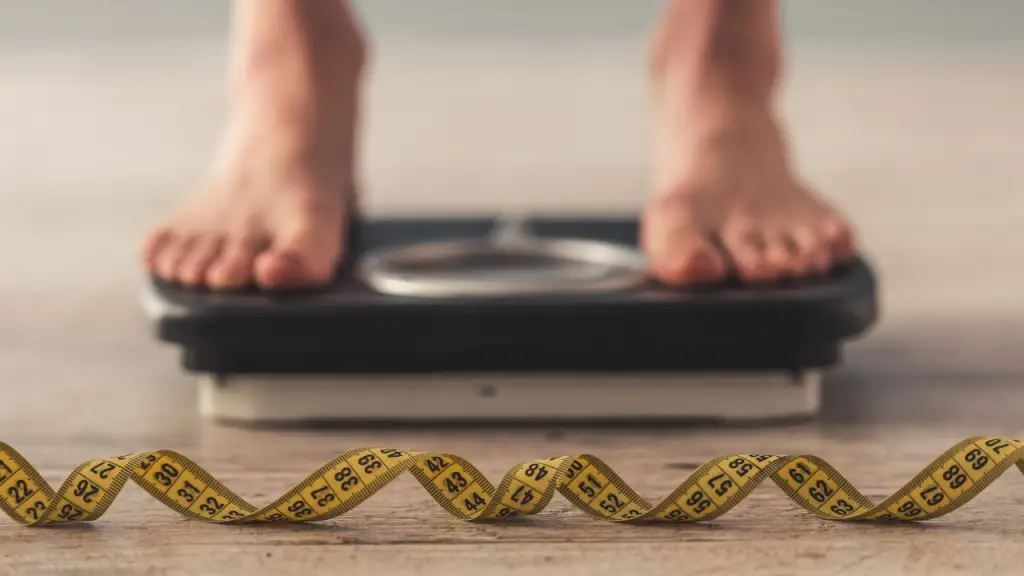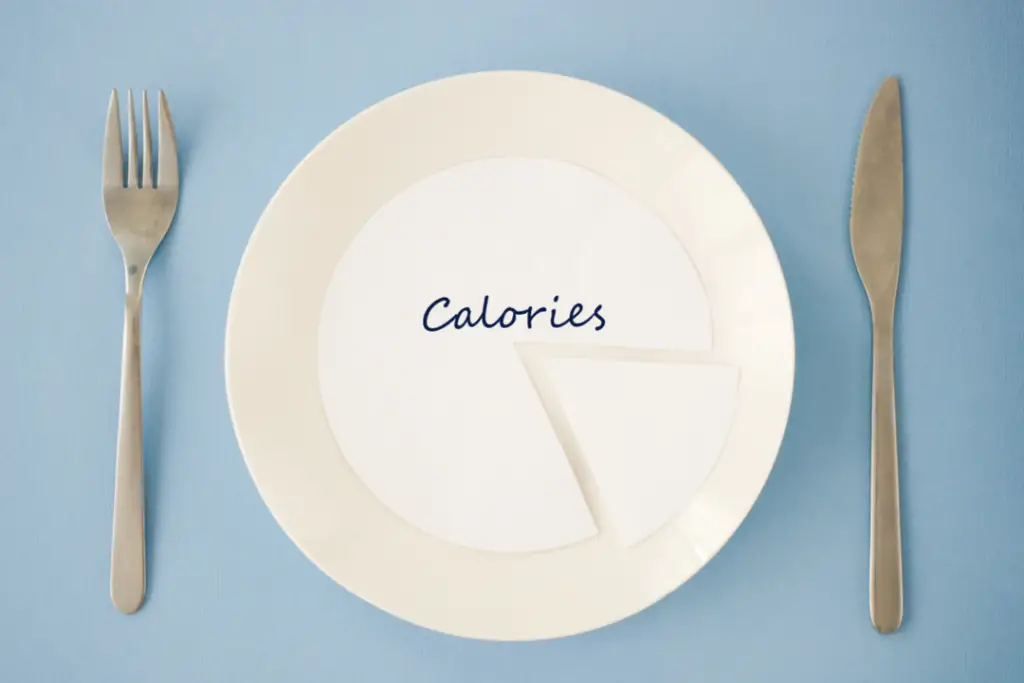I know how frustrating trying to lose weight can be! I spent over a decade trying all kinds of diets and cleanses to lose weight. Then, after turning 40, it got to a point where it was like I had to feel hungry all the time, not even to lose weight, but NOT to gain weight! Let me reassure you: you are not damaged or broken. The story can have the ending you want it to have. Today, we will examine the main reasons you can’t lose weight and discuss how you can create the outcome you want.
Reasons You Can’t Lose Weight
Losing weight is hard. The fact that you haven’t been able to lose weight doesn’t mean there is something wrong with you. Your body is designed to store weight in case you need it later. Your weight loss journey is a path to growth and self-discovery. You will achieve a healthier version of yourself both physically and mentally. I will bring your awareness to some main reasons you can’t lose weight so that you can explore and overcome them.

1. You Associate Food With Emotions
Your brain’s associations with foods can be hard to overcome. The first step is to recognize those associations.
Food Associations With Positive Emotions
For example, we associate cake with birthdays or cookies with Christmas. We feel like we can’t celebrate and experience events without the foods that come with our associations. Whenever we gather in communities, we eat food. That’s beautiful! The problem is that often the foods in question are far from optimal. We often feel that we can’t have a gathering without an assortment of snacks and desserts.
Food Associations With Negative Emotions
Chocolate when feeling stressed, anyone? Or what about when you are at a certain time during your monthly cycle? Yep, you know what I am talking about! We make powerful emotional associations with foods. Those can be hard to break and keep you from reaching your health goals.

2. Your Culture Is Causing Weight Gain
Throughout history, the average person did not have access to an abundance of food like we do now. Even the “poor” now eat like kings. Foods that are high in fats and sugars are readily available and affordable.
Three Meals A Day With Snacks
Most of us are pretty sedentary in our culture. A meal schedule that includes three meals a day and snacks will likely create a calorie surplus. Furthermore, our cultural norm is to have snacks and treats at all events, as I mentioned in the first point about our emotional associations with foods.
Processed Foods
Our ancestors had to make all the foods they ate. Now, you can buy all the prepackaged foods you would ever want. These foods are often addictive as they contain a perfect dopamine-releasing combination of fats and sugars. And the fact that you don’t need to make them will make it more likely that you will consume them.

3. You Snack Mindlessly
Among the reasons you can’t lose weight, this is probably one of the most common and easier ones to fix. Eating little bites here and there when preparing food, grazing, and eating on the go adds up over time. Moreover, it keeps your Insulin levels high. The more frequently you eat, the more you want to eat.
Grazing
Many health experts have recommended six smaller meals a day rather than two large meals. The goal was to keep your blood sugar stable. The problem with that idea is that your body has to produce insulin any time you eat. The more frequently your body produces insulin, the more likely you need more of it for the same effect (this is how we create insulin resistance). Fasting between meals gives your digestive tracts and your hormones a much-needed break.
A 24-week study compared eating two large meals a day with eating six smaller meals and found that eating two large meals improved insulin sensitivity. In the study, participants were assigned meal plans that reduced their calorie intake by 500 calories daily. For 12 weeks, they ate six meals a day, and for another 12 weeks, they ate two meals a day. The calorie reduction improved their insulin sensitivity and resulted in weight loss, but the results were more impressive during the two meals-a-day period.
Eating on the Go
Many of us have grown accustomed to eating on the go. We ignore the food we eat. We eat while driving, walking, or watching TV. Eating intentionally and paying attention to your food’s taste, texture, and flavor is important to increase satiety.

4. You Need to Define Your Why
For long-term success, you need to have a goal that drives you. For example:
- “Let’s see what’s possible. I want to do this for myself.”
- “I want to get to know my body better.”
- “I would like to learn about nutrition.”
- The feeling of confidence that comes with growing and changing.
There are no perfect whys, and yours why may change over time. But remembering why you are doing what you are doing will help you stay the course and get back on track when you stray.
Doing hard things can be fun! Don’t let your weight loss goals become a heavy burden. Make it a project that helps you grow as a person.
5. You Need to Improve Your Relationship With Food and Your Body
This is one of the harder reasons why you can’t lose weight. Your relationship with food and your body is complex. I am getting ready to launch a program about intuitive eating.
Food isn’t good or bad. It’s not a moral issue (for the most part). Food is nourishment, and your body is a miracle, regardless of shape and size. Learning to view food as a tool to love and care for your body takes time and practice. You will need to deconstruct some preconceived ideas you have.

How to Overcome the Reasons You Can’t Lose Weight
Maybe you struggle a little bit with all the reasons you can’t lose weight, or maybe you found one or two more applicable to you. Start by addressing one reason at a time. Ask yourself which reason is easiest to address and is most likely to give you a greater chance of success. I have some pointers to help you along the way.
Metabolic Flexibility
Metabolic flexibility is one of your allies when it comes to weight loss. It’s much harder to lose weight when you can’t switch from glucose to ketones for fuel. It’s one of the main reasons intermittent fasting without keto works so well for weight loss. Your body learns to switch back and forth from one fuel to another, and you gain freedom from food cravings over time.
That is the basis of my Intermittent Fasting Transformation Program. Don’t forget to sign up for my Intermittent Fasting 101 Workshop to learn more.

Changing Your Food Association
Fasting will also help you change your food associations not only because of the hormonal component (improve insulin sensitivity) but also because restricting your eating to a specific period will take away food for much o the day. Slowly but surely, you will stop associating emotions with food since food will no longer be a component of many activities and events in your life.
Enjoy Your Food
When you do eat, take the time to sit down and truly enjoy your food. Look at your food before you start eating. When you do eat, take the time to sit down and truly enjoy your food. Look at your food before you start eating. Let yourself be filled with thankfulness. Smell your food. When you start eating, Let yourself be filled with thankfulness. . When you start eating, chew slowly, taste your food, and feel the texture in your mouth. Pay attention to your posture. Take your time. These habits take time, and you will sometimes forget them, but learning to implement them is important. They will help you feel more satiated and stop eating mindlessly.
Pick Your Why
Take some time to ask yourself why you want to lose weight. Does your reason come from a place of self-loathing or a desire for growth? Can you make your why a positive one? Can you make it fun and light? Define your reasons for wanting to lose weight. Write them down and revisit them when you want to give up.
Reasons You Can’t Lose Weight Video
In Summary
There are five reasons why you can’t lose weight: your emotional attachment to food, your cultural practices, snacking mindlessly, a why that needs revisiting, and a poor relationship with food and your body. Intermittent fasting can be a powerful tool to overcome these stumbling blocks by regulating your blood sugar and dismantling some poor associations and habits.




